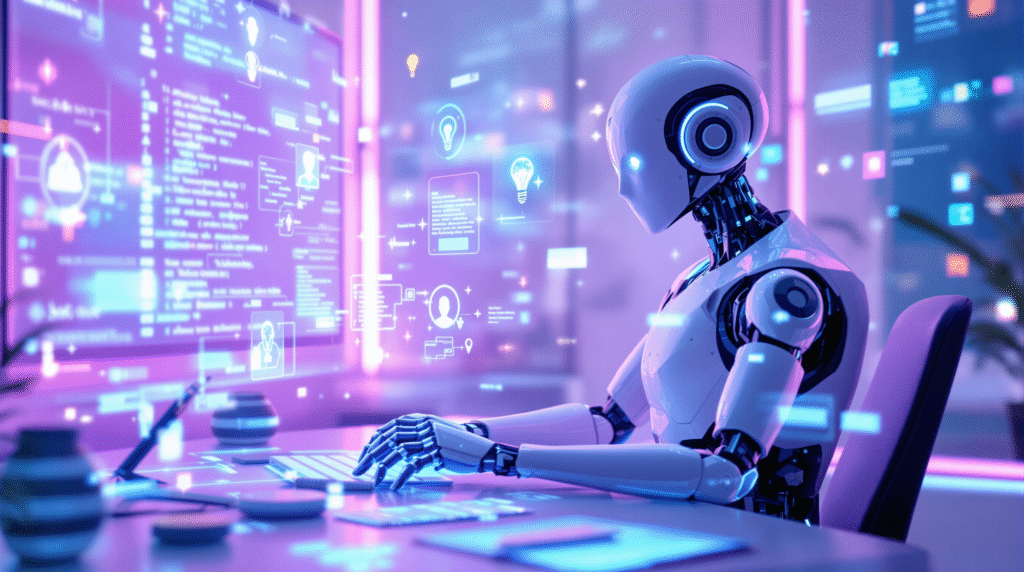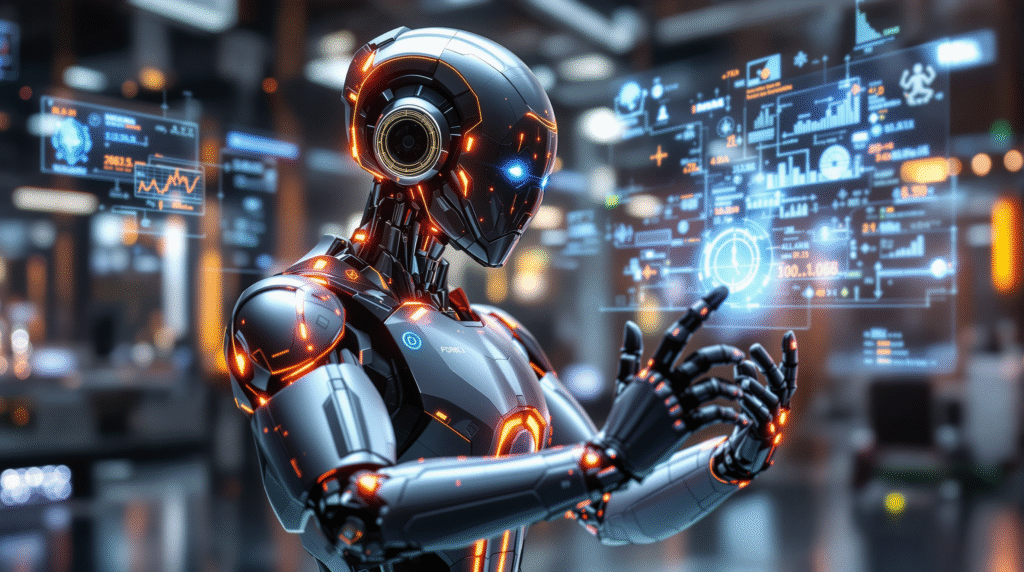Introduction: The Role of AI in Modern Code Creation
In today’s fast-paced software development landscape, artificial intelligence (AI) is transforming how code is created, refined, and optimized. Traditionally, coding has been a highly manual and creative process, relying heavily on the developer’s expertise, experience, and inspiration. However, with the advent of AI-powered tools, this process is becoming more collaborative and dynamic, enabling developers to push the boundaries of innovation.
AI acts as a creative partner that not only automates repetitive tasks but also inspires new ideas and approaches. By analyzing vast amounts of code, documentation, and user requirements, AI systems can suggest novel solutions, generate code snippets, and even help design entire software components. This assistance accelerates development cycles and reduces the cognitive load on programmers, allowing them to focus on higher-level problem-solving and creativity.
Moreover, AI’s ability to learn from diverse codebases and programming styles means it can adapt to different projects and developer preferences. This flexibility makes AI a valuable asset across various domains, from web and mobile applications to complex systems like artificial intelligence itself.
How AI Inspires Creativity in Software Development
Artificial intelligence is not just a tool for automating routine coding tasks—it also serves as a powerful source of inspiration for developers. By leveraging AI’s ability to analyze vast datasets, recognize patterns, and generate novel ideas, software creators can explore new possibilities that might otherwise remain undiscovered.
One way AI inspires creativity is through intelligent code suggestions. Modern AI-powered code editors and assistants can predict what a developer intends to write next, offering innovative snippets or alternative approaches that improve efficiency and code quality. These suggestions often introduce fresh perspectives, encouraging developers to think beyond their usual methods.
AI can also generate multiple solutions to a single problem, allowing developers to compare and select the best approach. This diversity of options fosters experimentation and innovation, helping teams find more elegant or efficient algorithms and designs.
Furthermore, AI-driven brainstorming tools can assist in conceptualizing software features or architectures by synthesizing information from existing projects, documentation, and user feedback. This capability helps developers identify unmet needs or novel functionalities, sparking creative ideas that align with user demands.
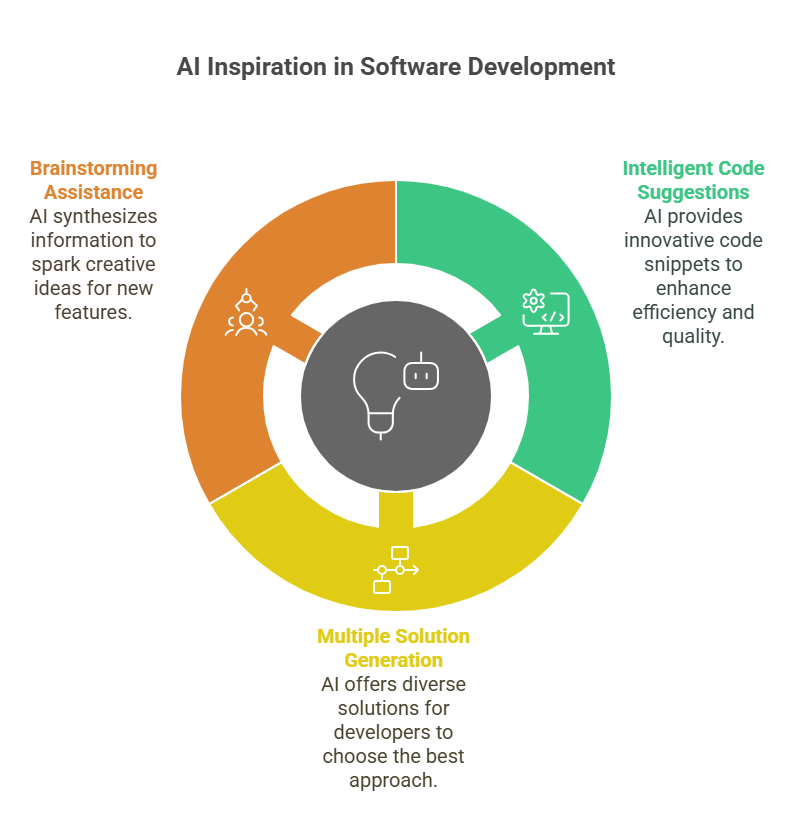
AI-Driven Code Generation: From Concept to Prototype
AI-driven code generation is revolutionizing the way software moves from initial ideas to working prototypes. Traditionally, transforming a concept into functional code required significant manual effort, time, and expertise. Today, AI technologies can accelerate this process by automatically generating code based on high-level descriptions, user stories, or design specifications.
Using natural language processing (NLP) and machine learning models trained on extensive code repositories, AI systems can interpret a developer’s intent and produce relevant code snippets or entire modules. This capability enables rapid prototyping, allowing developers to quickly test ideas and iterate on designs without writing every line of code from scratch.
Moreover, AI-generated code often includes best practices and optimized patterns learned from analyzing millions of existing projects. This not only speeds up development but also improves code quality and maintainability. Developers can then focus on customizing and refining the prototype, adding unique features and business logic.
Enhancing Developer Productivity with AI Assistance
Artificial intelligence is playing an increasingly vital role in boosting developer productivity by automating repetitive tasks, reducing errors, and providing intelligent support throughout the software development lifecycle. This assistance allows developers to focus more on creative problem-solving and less on mundane or time-consuming activities.
One of the most significant productivity gains comes from AI-powered code completion tools. These tools analyze the context of the code being written and predict the next lines or blocks of code, often suggesting entire functions or classes. By reducing the amount of manual typing and minimizing syntax errors, developers can write code faster and with greater confidence. This is especially valuable when working with unfamiliar libraries or complex APIs, where AI can guide the developer through correct usage patterns.
Beyond code completion, AI assists in debugging and error detection. Advanced AI systems can scan codebases to identify potential bugs, security vulnerabilities, or performance bottlenecks before they become critical issues. By flagging these problems early, developers save time that would otherwise be spent on troubleshooting and fixing defects after deployment. Some AI tools even suggest fixes or automatically generate patches, further accelerating the development process.
AI also enhances productivity by automating routine tasks such as code formatting, documentation generation, and testing. For example, AI can generate unit tests based on the code logic, ensuring better test coverage without requiring developers to write tests manually. Automated documentation tools powered by AI can create clear and concise explanations of code functions, making it easier for teams to maintain and onboard new members.
Moreover, AI-driven project management and collaboration tools help streamline workflows by prioritizing tasks, predicting project timelines, and facilitating communication among team members. These capabilities reduce administrative overhead and keep development efforts aligned with business goals.
Importantly, AI’s ability to learn from individual developer habits and team coding styles means that its assistance becomes more personalized and effective over time. This adaptive support helps maintain a smooth and efficient coding experience tailored to each developer’s needs.
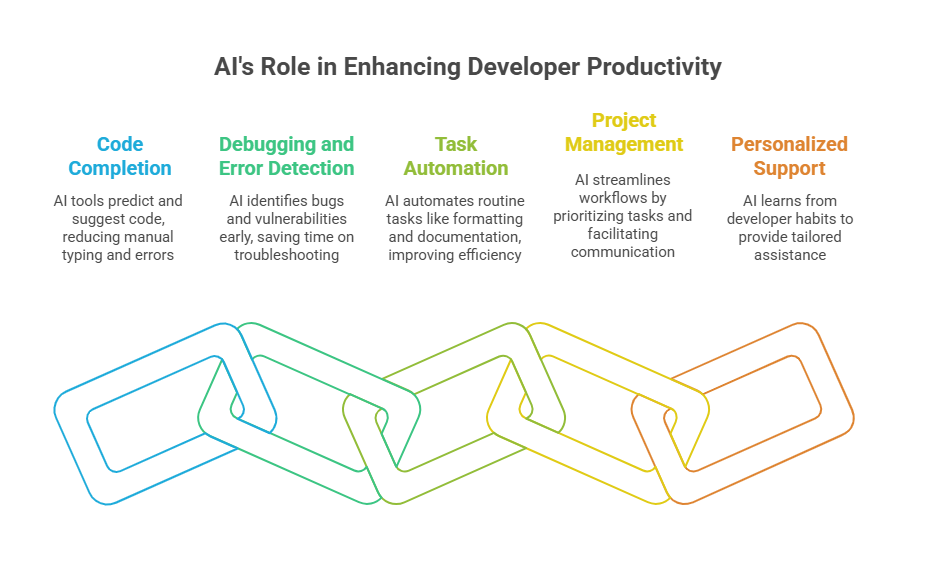
Collaborative Coding: AI as a Partner in Brainstorming
In modern software development, collaboration is key to innovation. AI is increasingly becoming an active partner in this collaborative process, especially during brainstorming sessions where ideas are generated and refined. Rather than replacing human creativity, AI enhances it by providing fresh perspectives, suggesting alternatives, and helping teams explore a wider range of possibilities.
AI-powered coding assistants can participate in brainstorming by analyzing project requirements, existing codebases, and user feedback to propose new features, architectures, or algorithms. These suggestions can spark discussions among developers, leading to more creative and well-rounded solutions. Because AI can process vast amounts of information quickly, it can identify patterns or opportunities that might be overlooked by human teams.
Moreover, AI tools can facilitate real-time collaboration by integrating with popular development environments and communication platforms. For example, during a virtual brainstorming session, an AI assistant might generate code snippets, diagrams, or documentation based on the team’s input, helping to visualize ideas and accelerate decision-making.
This partnership also extends to pair programming, where AI acts as a coding companion that offers suggestions, points out potential issues, and helps debug code on the fly. By reducing cognitive load and providing instant feedback, AI enables developers to focus more on creative problem-solving and less on routine tasks.
Overall, AI as a brainstorming partner fosters a more dynamic and inclusive creative process. It encourages experimentation, supports diverse viewpoints, and helps teams innovate faster and more effectively.
Python Example: AI-Assisted Brainstorming for Feature Ideas
Here’s a simple Python example simulating an AI assistant that helps brainstorm feature ideas based on a project description. This example uses keyword matching to suggest relevant features.
python
class AIBrainstormingAssistant:
def __init__(self):
self.feature_ideas = {
"chat": ["Real-time messaging", "Message encryption", "Chatbots integration"],
"e-commerce": ["Shopping cart", "Payment gateway", "Product recommendations"],
"analytics": ["Data visualization", "Predictive analytics", "Real-time dashboards"],
"security": ["Two-factor authentication", "Data encryption", "Access control"],
}
def suggest_features(self, project_description):
suggestions = set()
description = project_description.lower()
for keyword, features in self.feature_ideas.items():
if keyword in description:
suggestions.update(features)
if not suggestions:
return ["No specific features found. Consider adding user authentication, logging, or notifications."]
return list(suggestions)
# Example usage
assistant = AIBrainstormingAssistant()
project_desc = "We are building an e-commerce platform with chat support and analytics."
features = assistant.suggest_features(project_desc)
print("AI Brainstorming Suggestions:")
for feature in features:
print(f"- {feature}")This simple AI assistant scans the project description for keywords and suggests relevant features to consider. In real-world applications, AI brainstorming tools would use more advanced natural language processing and machine learning to generate richer and more context-aware ideas.
AI Tools for Exploring Innovative Algorithms and Solutions
Artificial intelligence is transforming how developers explore and create innovative algorithms and solutions. Traditional algorithm design often relies on human intuition, experience, and trial-and-error, which can be time-consuming and limited by cognitive biases. AI tools, however, can analyze vast datasets, simulate numerous scenarios, and generate novel approaches that push the boundaries of what’s possible.
One of the key strengths of AI in this area is its ability to perform automated algorithm discovery and optimization. Techniques such as genetic programming, reinforcement learning, and neural architecture search enable AI systems to evolve or learn algorithms tailored to specific problems. For example, AI can discover more efficient sorting methods, optimization strategies, or data processing pipelines that outperform conventional solutions.
AI also aids in exploring complex problem spaces where traditional methods struggle. In fields like cryptography, bioinformatics, or large-scale data analysis, AI can identify patterns and relationships that humans might miss, leading to breakthroughs in algorithm design. By simulating thousands of variations and evaluating their performance, AI accelerates the search for optimal or near-optimal solutions.
Moreover, AI-powered tools can assist developers by suggesting algorithmic improvements or alternative approaches based on the context of the problem. These suggestions can inspire developers to rethink their strategies, experiment with new techniques, and ultimately create more innovative and effective software.
Integration of AI into algorithm exploration also supports interdisciplinary collaboration. AI can bridge gaps between domain experts and developers by translating complex requirements into algorithmic concepts, facilitating the creation of solutions that are both technically sound and aligned with real-world needs.
Overcoming Creative Blocks with AI Suggestions
Creative blocks are a common challenge for developers and software engineers, especially when tackling complex problems or designing innovative features. These blocks can slow down progress, cause frustration, and limit the potential of a project. AI-powered suggestion tools are increasingly being used to help overcome these hurdles by providing fresh ideas, alternative approaches, and insightful prompts that reignite creativity.
AI systems can analyze the current state of a project, including code, documentation, and user requirements, to generate context-aware suggestions. These might include new design patterns, algorithmic strategies, or even entirely different ways to approach a problem. By offering diverse perspectives, AI helps developers break out of mental ruts and explore solutions they might not have considered.
One of the key advantages of AI in overcoming creative blocks is its ability to learn from vast amounts of data, including open-source projects, research papers, and developer forums. This broad knowledge base allows AI to surface innovative ideas that combine best practices with novel concepts, tailored to the specific challenges faced by the developer.
Additionally, AI-powered suggestion tools can provide incremental guidance, such as recommending small code refactors, alternative libraries, or debugging tips. These micro-suggestions can gradually build momentum, helping developers regain confidence and move forward with their work.
Beyond individual assistance, AI can facilitate collaborative creativity by aggregating suggestions from multiple sources and presenting them in an organized way. This supports team brainstorming sessions and encourages collective problem-solving.
In essence, AI acts as a creative partner that not only accelerates problem-solving but also enriches the development process by continuously inspiring new ideas and approaches. By integrating AI suggestions into their workflow, developers can overcome creative blocks more effectively and maintain a steady pace of innovation.
Integrating AI into Development Workflows
Integrating AI into development workflows is becoming essential for modern software teams aiming to boost efficiency, improve code quality, and accelerate delivery. AI tools can be embedded at various stages of the software development lifecycle—from planning and coding to testing and deployment—creating a seamless, intelligent workflow that supports developers every step of the way.
Step 1: Identifying Workflow Stages for AI Integration
The first step is to identify which parts of the workflow can benefit most from AI assistance. Common integration points include:
Code writing and completion: AI-powered code completion tools help developers write code faster and with fewer errors.
Code review and quality checks: AI can automatically review code for bugs, style issues, and security vulnerabilities.
Testing: AI can generate test cases, prioritize tests, and analyze test results to detect flaky or failing tests.
Continuous integration/continuous deployment (CI/CD): AI can optimize build pipelines, predict deployment risks, and automate rollback decisions.
Project management: AI can assist in task prioritization, resource allocation, and progress prediction.
Step 2: Choosing AI Tools and Platforms
Teams select AI tools that integrate well with their existing environments, such as IDE plugins, cloud-based AI services, or custom AI models. Popular AI assistants like GitHub Copilot or specialized static analysis tools can be plugged directly into code editors or CI pipelines.
Step 3: Automating AI-Driven Feedback Loops
Once integrated, AI tools provide continuous feedback. For example, as developers write code, AI suggests completions or flags potential issues. During code reviews, AI highlights risky changes. In testing, AI recommends additional test cases or points out flaky tests. This continuous feedback loop helps maintain high code quality and reduces manual effort.
Step 4: Monitoring and Improving AI Integration
Teams monitor AI tool performance and developer satisfaction, adjusting configurations or retraining models as needed. This ensures AI assistance remains relevant and effective.
Python Example: Simple AI Integration for Automated Code Review
Below is a simplified Python example demonstrating how an AI-powered code review assistant might be integrated into a development workflow. This assistant analyzes Python code snippets for common issues like unused imports or missing docstrings and provides feedback.
python
import ast
class SimpleCodeReviewAI:
def __init__(self, code):
self.code = code
self.tree = ast.parse(code)
self.issues = []
def check_unused_imports(self):
imports = {node.names[0].name for node in ast.walk(self.tree) if isinstance(node, ast.Import)}
used_names = {node.id for node in ast.walk(self.tree) if isinstance(node, ast.Name)}
unused = imports - used_names
for imp in unused:
self.issues.append(f"Unused import detected: '{imp}'")
def check_missing_docstrings(self):
for node in ast.walk(self.tree):
if isinstance(node, (ast.FunctionDef, ast.ClassDef)):
if ast.get_docstring(node) is None:
self.issues.append(f"Missing docstring in {node.__class__.__name__} '{node.name}'")
def run_review(self):
self.check_unused_imports()
self.check_missing_docstrings()
return self.issues
# Example usage
code_sample = '''
import os
import sys
def greet(name):
print(f"Hello, {name}!")
class Person:
pass
'''
reviewer = SimpleCodeReviewAI(code_sample)
feedback = reviewer.run_review()
print("AI Code Review Feedback:")
for issue in feedback:
print(f"- {issue}")How this fits into a workflow: This kind of AI assistant could be triggered automatically during a pull request or commit, providing developers with immediate feedback on code quality before merging. Over time, more sophisticated AI models can be integrated to catch complex issues and suggest fixes.
Ethical Considerations in AI-Generated Code
As AI becomes more deeply integrated into software development, ethical considerations surrounding AI-generated code are increasingly important. While AI tools can accelerate coding, improve quality, and inspire innovation, they also raise questions about responsibility, transparency, bias, and intellectual property.
Responsibility and Accountability
When AI generates code, it can be unclear who is responsible for errors, security vulnerabilities, or unintended consequences. Developers and organizations must ensure that AI-generated code is thoroughly reviewed and tested. Ultimately, human oversight remains essential to maintain accountability and uphold software quality and safety standards.
Transparency and Explainability
AI models often operate as “black boxes,” making it difficult to understand how specific code suggestions or decisions are made. This lack of transparency can hinder debugging, auditing, and trust. Developers should strive to use AI tools that provide explanations or rationale for their outputs, enabling better understanding and informed decision-making.
Bias and Fairness
AI models trained on existing codebases may inadvertently learn and propagate biases present in the training data. This can lead to code that reflects unfair assumptions, security weaknesses, or exclusionary practices. It is important to evaluate AI-generated code for bias and ensure it aligns with ethical standards and inclusive design principles.
Intellectual Property and Licensing
AI-generated code may incorporate snippets or patterns from copyrighted sources, raising legal and licensing concerns. Developers must be aware of the provenance of AI training data and ensure compliance with software licenses. Clear policies should be established regarding ownership and usage rights of AI-generated code.
Security and Privacy
AI-generated code must be scrutinized for potential security vulnerabilities or privacy risks. Automated code generation can sometimes introduce subtle flaws that attackers might exploit. Integrating security reviews and using AI tools designed with security in mind can mitigate these risks.
Human-AI Collaboration Ethics
The use of AI in coding also impacts workforce dynamics, raising questions about job displacement, skill development, and equitable access to AI tools. Organizations should consider how to balance AI assistance with human creativity and ensure that AI augments rather than replaces human developers.
In conclusion, ethical considerations are critical to responsibly harnessing AI in software development. By addressing these challenges proactively, developers and organizations can build trustworthy, fair, and secure AI-assisted coding practices that benefit the entire software ecosystem.
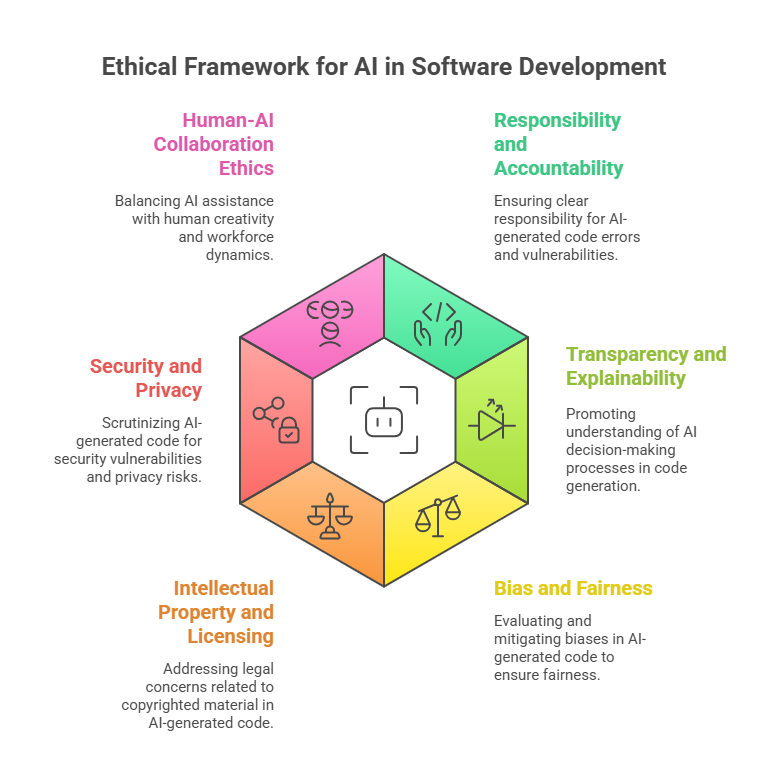
Case Studies: Successful Projects Powered by AI Inspiration
AI-driven creativity is reshaping software development by enabling innovative solutions and accelerating the coding process. Numerous projects across industries showcase how AI inspiration leads to breakthrough applications and improved workflows.
Case Study 1: GitHub Copilot
GitHub Copilot, powered by OpenAI’s Codex, assists developers by generating code snippets and entire functions based on natural language prompts. It has transformed how developers prototype and write code, increasing productivity and reducing boilerplate coding.
Case Study 2: DeepMind AlphaCode
DeepMind’s AlphaCode generates competitive programming solutions by learning from vast datasets of coding problems and solutions. It demonstrates AI’s potential to tackle complex algorithmic challenges, inspiring new approaches to problem-solving.
Case Study 3: AI-Driven Game Development
AI tools are used to generate game assets, design levels, and even create storylines, enabling faster game development cycles and richer player experiences. Projects like AI Dungeon showcase AI’s creative storytelling capabilities.
Case Study 4: Automated UI Design
AI-powered platforms generate user interface designs based on user requirements and best practices, accelerating front-end development and ensuring usability. This approach inspires designers and developers to explore novel layouts and interactions.
Case Study 5: Personalized Learning Platforms
AI-driven educational software adapts content and exercises to individual learners, creating personalized learning paths. These platforms inspire new pedagogical methods and improve educational outcomes.
These examples highlight AI’s role as a creative catalyst, augmenting human ingenuity and enabling developers to build more innovative, efficient, and user-centric software.
Future Trends: AI’s Evolving Role in Creative Coding
The future of AI in creative coding is bright, with emerging technologies promising to deepen AI’s impact on software innovation. Key trends include:
Generative AI Expansion: AI models will generate increasingly complex code, designs, and content, enabling rapid prototyping and creative exploration.
Multimodal AI: Combining text, images, audio, and code to create richer, more interactive applications.
Human-AI Collaboration: Enhanced interfaces will allow seamless collaboration between developers and AI, blending human creativity with machine intelligence.
Explainable AI: Improved transparency will help developers understand AI-generated suggestions, fostering trust and better decision-making.
Ethical AI Development: Focus on fairness, accountability, and responsible AI use in creative processes.
These trends will empower developers to push the boundaries of what’s possible, making AI an indispensable partner in software creation.
Conclusion: Embracing AI as a Catalyst for Innovation in Software Development
AI is no longer just a tool but a transformative force driving innovation in software development. By inspiring new ideas, automating routine tasks, and enhancing collaboration, AI enables developers to create better software faster and with greater creativity.
Embracing AI requires balancing automation with human insight, addressing ethical considerations, and continuously adapting to evolving technologies. Developers who harness AI’s potential will lead the next wave of software innovation, delivering applications that are more intelligent, efficient, and user-centric.
The future of software development is a partnership between humans and AI—together shaping a new era of creativity and productivity.
AI Agents: Potential in Projects
The AI Agents: The Secret to Developer Efficiency.
Intelligent Agents: How Artificial Intelligence Is Changing Our World
